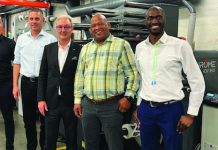By 2050 the world’s population is predicted to reach 9,1 billion, which will require an increase of 70% food availability. With 33% of food lost or wasted each year, high-performance packaging plays a critical role in today’s global food delivery system.
Tetra Pak South Africa has launched the Go Nature Go Carton campaign to highlight that growing populations need access to food packaging that keeps the contents safe, nutritious and available. Yet packaging can cause problems for the planet.
‘The world needs a package that maximises the use of materials with a reduced impact on nature,’ said Stefan Fageräng, MD of Tetra Pak Southern Africa. ‘We believe that fibre-based carton packages are a more sustainable option currently on the market today. Even so, they contain thin layers of plastic and aluminium, in order to secure food safety, which is where we see the potential to do better.’
This means developing a carton that can represent a solution for nature and climate, responding to challenges such as:
– Using only renewable or recycled materials and not draining the planet of limited resources.
– Supporting carbon-neutral production and distribution.
– Ensuring a resilient food system that expands food access and secures food safety while reducing food waste.
– Helping support full recycling to keep materials in use.
– Focusing on the use of materials with a reduced impact on nature.
‘With Go Nature Go Carton, we are accelerating our evolution to create the world’s most sustainable food package. We know that what we do works for people, but we need to create a carton that works even better for the planet,’ said Fageräng.
Tetra Pak’s journey to develop this includes:
– Maximising the use of materials that reduce the impact on nature: increasing the paper-based and plant-based content in their packages, and sourcing these raw materials in a way that protects biodiversity and natural environments.
– Securing carbon-neutral production and distribution. Tetra Pak will reach net zero greenhouse gas (GHG) emissions and 100% renewable energy by 2030, striving to achieve net zero for the value chain by 2050.
– Continuing to unwaveringly protect food and ensure food safety and availability for a growing number of people around the world while preventing food waste with farm-to-table processing technologies.
– Developing a fully recyclable package with a supporting collection, sorting and recycling infrastructure everywhere, to keep materials in use for as long as possible.
– Reducing the amount of plastic and aluminium, while increasing the paper-based content in packages, since waste management systems across the world are far from optimal and not all materials can be infinitely recycled.
‘It is not enough to have a circular packaging model that is blind to energy intensity, carbon emissions and end of life impact. We need a holistic environmental approach that subsumes a radical decarbonisation of materials, to reduce the impact on our planet,’ concluded Fageräng.
TETRA PAK SOUTH AFRICA
+27 11 570 3000
https://www.tetrapak.com/za/





















